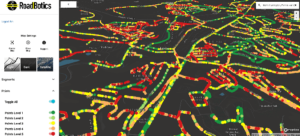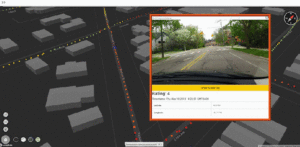Carnegie Mellon University (CMU) spinoff company RoadBotics has closed a US$7.5m Series A funding round that will be used to further develop its computer vision and Artificial Intelligence (AI) technology used for road assessment.
Historically, most local governments and highways agencies have manually inspected their roads for surface distresses, allowing subjective data to creep into the decision process when making plans for repairs. RoadBotics technology uses machine learning to rate road conditions, making the data objective, and more cost-effective and faster than traditional inspection methods, allowing road managers to adopt a more regular inspection schedule. The company uses a standard smartphone mounted on a vehicle’s windshield to capture roadway imagery that is processed by cutting-edge deep learning AI software to speed up the normally subjective and expensive pavement inspection process.
RoadBotics’ online RoadWay GIS platform offers decision-makers an easy way to monitor their road networks, communicate budget needs to city council, or resolve citizen complaints. The roads and photos of each 10 feet (3m) long segment are color-coded from green to red, allowing anyone from a council member or a citizen to a field operator to use it without any prior knowledge or training. Only two and half years since its founding, RoadBotics already has over 150 customers in 23 USA states and 11 countries worldwide.
The company’s latest round of funding was led by AI-focused venture capital fund Radical Venture, with other investors including Hyperplane Venture Capital and Wharton Alumni Angels of Silicon Valley. RoadBotics will use the new finance to accelerate its growth and development of new products in order to further help local governments and other infrastructure asset managers to get important, objective data about their roads.
“This fresh capital, together with Radical’s vast network and Artificial Intelligence domain expertise, will enable us to grow even faster, and ultimately to extend our reach into other vertical markets,” said Mark DeSantis, co-founder and chief executive officer at RoadBotics. “No one understands the impact deep learning is and will have on the management of large-scale public infrastructure like the Radical team, who previously built their own deep learning company. They share our vision of AI helping to create a safer, better future.”
 Radical Ventures recently launched a US$350m fund focused on AI applications. Radical’s co-founder and managing partner, Jordan Jacobs, commented, “Maintaining roads has an enormous financial cost, hundreds of billions of dollars globally each year, mostly borne by governments and thus taxpayers. Assessing roads has been done the same way for thousands of years; people riding around and subjectively determining what to fix and when. RoadBotics’ simple-to-use computer vision system enables continuous, objective assessments that help prioritize what needs to be fixed. This saves enormous costs, reduces damage to vehicles and can saves lives. RoadBotics is a perfect example of AI fixing an enormous global problem.”
Radical Ventures recently launched a US$350m fund focused on AI applications. Radical’s co-founder and managing partner, Jordan Jacobs, commented, “Maintaining roads has an enormous financial cost, hundreds of billions of dollars globally each year, mostly borne by governments and thus taxpayers. Assessing roads has been done the same way for thousands of years; people riding around and subjectively determining what to fix and when. RoadBotics’ simple-to-use computer vision system enables continuous, objective assessments that help prioritize what needs to be fixed. This saves enormous costs, reduces damage to vehicles and can saves lives. RoadBotics is a perfect example of AI fixing an enormous global problem.”
RoadBotics’ director of engineering, Miguel Dickson, said, “The new products we’re building use data in ways not available to road managers until now. We’re taking our value proposition, objective, easy-to-use, easy-to-explain automated assessment, and expanding on it. The new products we’re introducing will continue to leverage AI and data science to make more road management tasks straight-forward and easily communicable to all the relevant stakeholders.”





